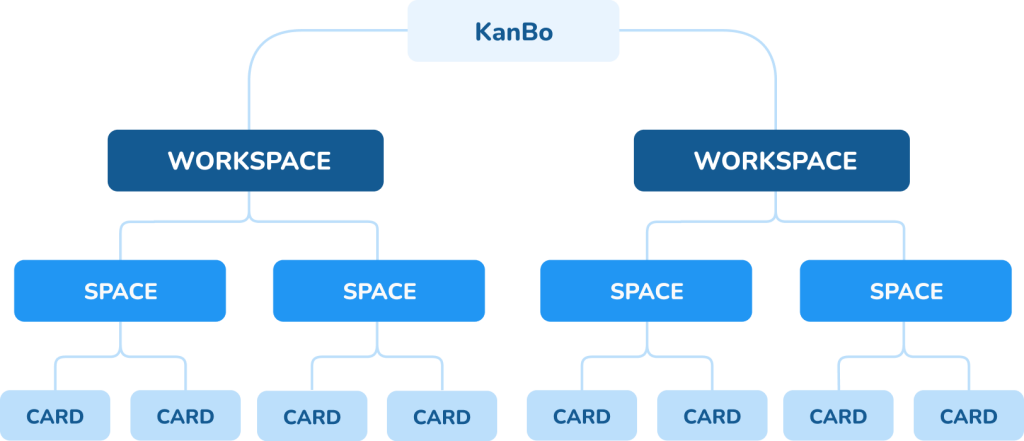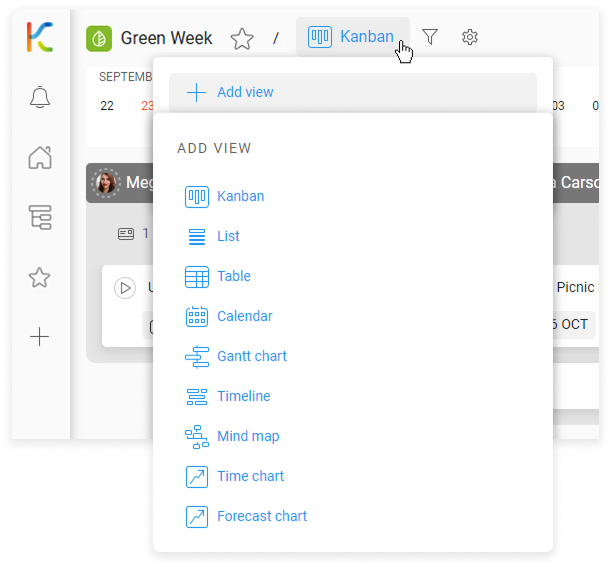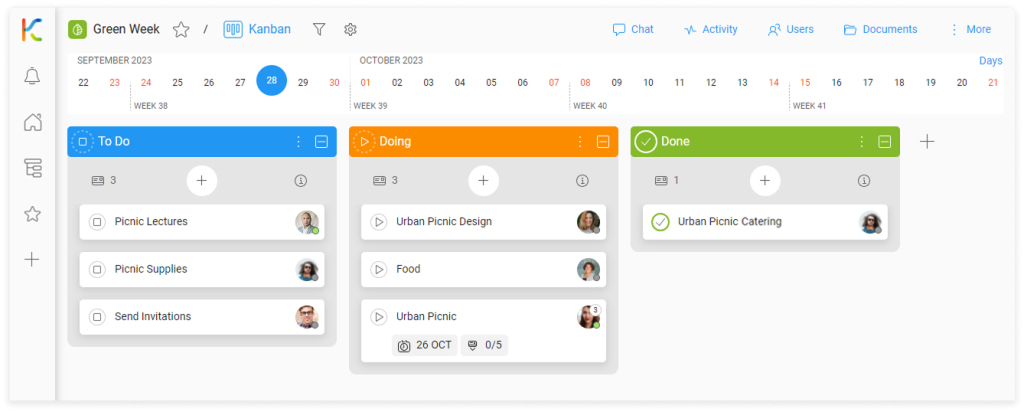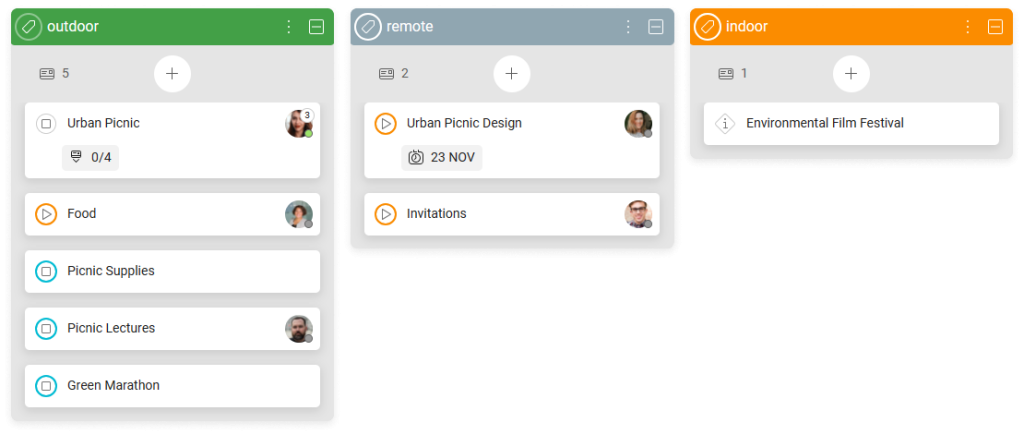Overview
KanBo Getting Started
4. Working with Spaces
Learn KanBo > Getting Started with KanBo > Working with Spaces
Learn KanBo > Getting Started with KanBo > Working with Spaces
Working with Spaces
Another of KanBo’s building blocks are spaces, which allow users to organize and manage their cards effectively. In this article, we will guide you through the process of working with them.
The steps in the video are also described in the following sections.
Follow the video with the step-by-step instruction →
Article
Working with Spaces
In this article:
Introduction
Understanding the position of spaces in the KanBo hierarchy is very important to using their full capabilities. You already know cards, so you are familiar with spaces. They are a great tool for visualizing and analyzing your work, and here you will learn how to use their basic features.

Spaces are always located within workspaces. Therefore, in order to create a space, you first need a workspace.
If you don’t have a space prepared by your colleagues, learn how to create one. See the article Create a Space for Your Work.
If you already have a space filled with cards, see how to manage them.
Card statuses
Often the first feature you interact with is the card status, which provides insight into the progress of your tasks. With easy customization options, you can rename the status and change its color.
In our sample workflow, we have three card statuses, each with a different status role, indicating different stages in the task pipeline. However, you can add more statuses as needed.
Card status roles:
 Not started – The default initial status. It indicates tasks that are not currently being performed.
Not started – The default initial status. It indicates tasks that are not currently being performed. In progress – This status is used to indicate that a card is already in progress.
In progress – This status is used to indicate that a card is already in progress. Completed – This status indicates that the card has been completed.
Completed – This status indicates that the card has been completed.  Information – A status used to locate cards that contain important information but are not executable.
Information – A status used to locate cards that contain important information but are not executable. Canceled – A status for cards that have been stopped and cannot be completed.
Canceled – A status for cards that have been stopped and cannot be completed.
Remember that the order of the card statuses is important. Therefore, you can change their order to better suit your task pipeline. Also, adding more card statuses is easy and helps to make task tracking more efficient.
Each card status is represented visually by an icon surrounded by a progress indicator. This indicator fills up as you work on the card, even if it’s part of a task, like a to-do list item. This allows you to keep track of how close a card is to completion.
Card grouping
Another elementary feature in KanBo is card grouping, which allows you to categorize your cards based on specific criteria or categories. By default, cards are grouped by status.
EXAMPLE: To Do, Doing, and Done are three card statuses by which cards are grouped.
However, you can customize this by selecting different attributes, such as due dates, users, or custom fields, to group your cards. This makes it easier to focus on specific areas of work within a space.
EXAMPLE: Cards grouped by users. If more than one user is assigned to a card, the card will appear multiple times.
Custom fields
Cards can be organized in a personalized way using custom fields. They allow you to create and define specific tags that are relevant to your project or task.
Custom fields are:
Space views
KanBo’s greatest strength is the ability to add more space views. They are based on the most effective working techniques such as Kanban, Gantt Chart and Mind Map, which present your tasks and projects in different visual formats.

These views allow you to choose the one that best suits your needs and preferences, giving you a comprehensive view of your tasks and enabling you to better manage your project. Go to the next article to learn how to use space views.
Follow the video step-by-step
Open your space using Sidebar and ![]() Workspaces & Spaces to follow the instruction.
Workspaces & Spaces to follow the instruction.
Card statuses
- Select the card status name, on a pop-up window enter the new name, an then select Save.
- On the card status name bar, go to More (the three-dots menu)
- Go to Role/Color, and select desired option.
To add a new card status:
- Select the + button after the last status group.
- Enter the name of the status, select role and color, and then select Add.
To change the order of card statuses:
- Drag a status group and move it to the new place.
To add a card with particular card status:
- Select the + button within the desired card status group, enter the card name, and then select Create card.
To see the percentage progress of card realization:
- Hover over the card status icon on the card front.
Card grouping
To change the card grouping:
- On the top space bar, go to
 Settings > Horizontal grouping, and then select the way of card grouping.
Settings > Horizontal grouping, and then select the way of card grouping.
Custom fields
To create a label:
- Open a card.
- On the card details section, in the Custom fields area, select the + button.
- On the pop-up window, select + Create, enter the label name, and then select Create.
To add a label to a card:
- Open the card.
- On the card details section, in the Custom fields area, select the + button.
- Select the label from the list.
OR
- On the top space bar, select
 Settings > Horizontal grouping > Labels.
Settings > Horizontal grouping > Labels. - Drag a card and move it to the desired label grouping.
Display settings
In order to save the changes to the display settings:
- At the top of the space, on the pop-up window View has unsaved changes, select Save.
Follow the video step-by-step
Open your space using Sidebar and ![]() Workspaces & Spaces to follow the instruction.
Workspaces & Spaces to follow the instruction.
Card statuses
- Select the card status name, on a pop-up window enter the new name, an then select Save.
- On the card status name bar, go to More (the three-dots menu)
- Go to Role/Color, and select desired option.
To add a new card status:
- Select the + button after the last status group.
- Enter the name of the status, select role and color, and then select Add.
To change the order of card statuses:
- Drag a status group and move it to the new place.
To add a card with particular card status:
- Select the + button within the desired card status group, enter the card name, and then select Create card.
To see the percentage progress of card realization:
- Hover over the card status icon on the card front.
Card grouping
To change the card grouping:
- On the top space bar, go to
 Settings > Horizontal grouping, and then select the way of card grouping.
Settings > Horizontal grouping, and then select the way of card grouping.
Custom fields
To create a label:
- Open a card.
- On the card details section, in the Custom fields area, select the + button.
- On the pop-up window, select + Create, enter the label name, and then select Create.
To add a label to a card:
- Open the card.
- On the card details section, in the Custom fields area, select the + button.
- Select the label from the list.
OR
- On the top space bar, select
 Settings > Horizontal grouping > Labels.
Settings > Horizontal grouping > Labels. - Drag a card and move it to the desired label grouping.
Display settings
In order to save the changes to the display settings:
- At the top of the space, on the pop-up window View has unsaved changes, select Save.



